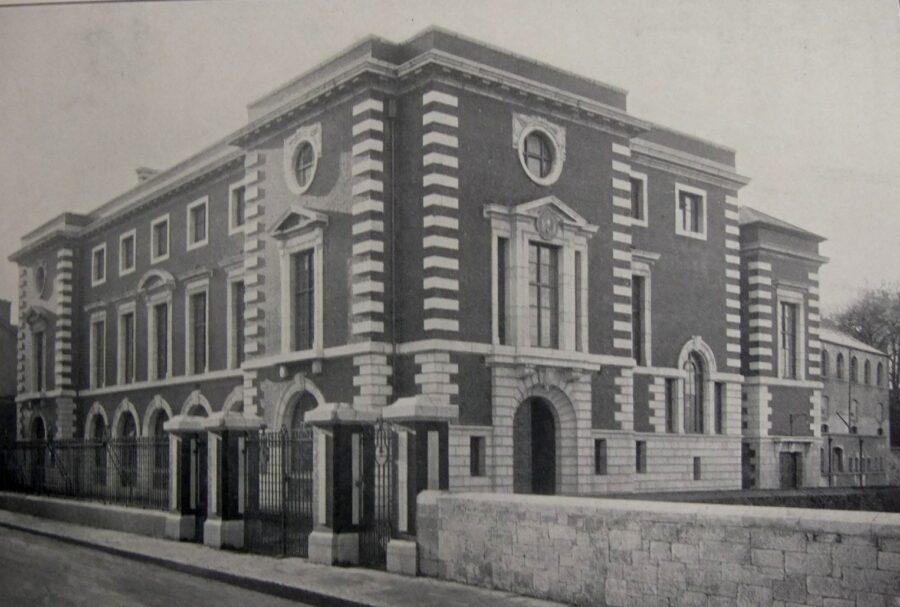
Kieran’s Our City, Our Town Article,
Cork Independent, 26 September 2024
Making an Irish Free State City – Training for the Future
Life in 1920s Cork and the emergence of the Irish Free State coincided with the need for training and re-training for much of Cork’s working society especially in trades and professions. There was a quest to build more houses and so more labourers were needed. There was the advent of motor cars and hence more mechanics were needed. In addition, the textile industries such as in Douglas and Blackpool needed more trained labour.
At the heart of the training and re-training was the Crawford Technical Institute l. Since its foundation in 1912, its progress was very rapid as well as its success. By September 1924 the student population in some of the departments was under pressure to take in more students. It was envisaged that during the decade of the 1920s it would see another increase in the number of students.
The Cork Examiner showcased the Technical Institute in an editorial on 11 September 1924. It lists the Institute as is one of the best equipped of its kind; “It possesses up-to-date lecture rooms, drawing offices, laboratories and workshops. The welfare of the home is also catered for by modern kitchens for cookery and workrooms for dressmaking, needlework, millinery, shirt making, etc…The curriculum of the school embraces most of the various trades and professions and such training as is afforded by these classes is now generally admitted to be a necessity for all those who wish to become qualified for a career”.
The bulk of the classes, except those in domestic economy and university courses in engineering, were evening classes only. The general fee for any course of study was 10s except domestic economy, which was 7s 6d. A junior technical course was 5s with a few other exceptions. A new course in wireless telegraphy was planned to be established for those interested in what was an emerging popular science.
In 1924, the Crawford Municipal Technical Institute was now included in the official list of technical colleges issued by the Ministry of Industry and Commerce of the Free State Government, and also by the British Board of Trade, where attendance was recognised as affording remission of some period of workshop service.
The Cork Examiner also outlines that the success achieved by students of the Technical Institute, which they were proud of. At an examination in 1924 held under the City and Guilds of London one of the students Kathleen Carroll took first place in the United Kingdom in the Builders’ Quantities Examination and was awarded a bronze medal.
In addition, the Cork County Borough Technical Instruction Committee had established day courses in mechanical and electrical engineering in order to provide instruction of an “advanced character” not previously available in the South of Ireland.
On 21 September 1925 at the opening of the 1925-26 Institute season, a Cork Examiner editorial highlighted that it was hoped that parents would realise the importance of insisting on their children continuing their education in the evening schools after leaving their daily secondary school work; “It will strengthen the habits of industry and amenability there formed. If there is a break between day and evening schools these habits are weakened. Much of the knowledge already acquired will be forgotten, which will seriously handicap the boys and girls in any subsequent endeavour they may take. In addition, attendance at evening classes will give them a fuller knowledge of the principles underlying the practice of their trade or occupation, and a better trained brain to enable them to rise to positions of responsibility and trust”.
In September 1926, the Cork Examiner relates that for the 1926-27 Technical Institute season that in addition to the well-established classes a new course was being formed for employees in motor garages, other than apprentices. As motor cars began to become cheaper to purchase, the need for trained mechanics was needed. The classes aimed to be distinct from those already in operation for motor apprentices. The Technical Institute wished to bring employees in touch with the construction and working of various types of contemporary cars. The course was also aimed at amateur motorists to learn about simple fault finding and adjustments common to a motor car owner.
A new course in machine knitting was also to be established, suitable for the training of young girls for the textile factories in operation in the city. A course for hotel cooks was to be launched. As new hotels opened in the country and tourism strategies emerged, there was a need to improve the catering in many of the hotels.
By 1930, the need to get teenagers, in particular, who left schools into employment was high on the Irish Free State Government’s priorities. A Vocational Education Bill was enacted in that year. The bill would affect changes to 69 technical schools across the country. Full day continuation courses were created.
The main purpose of the new scheme of continuation education was to provide vocational instruction for young persons between 14 and 16 years of age who had left the primary or secondary school. However, students over 16 years of age could be admitted to those classes if their educational standard was not high enough to qualify for entry to the specialised trade and other courses. The acquisition of skill in some form of handwork would form an essential feature of the training and any subjects would be delivered with employment in mind.
In Cork, from mid-September 1930 arrangements were made for the establishment of a day school in the Crawford Technical Institute. The day course would consist of general subjects for boys and girls and, in addition, science and trades subjects for boys and domestic subjects for the girls. Attendance would be necessary for 25 hours per week. An examination for entry to the day course would also be needed.
Caption:
1272a. Crawford Municipal Technical Institute, Cork, 1912 (source: Cork City Library)